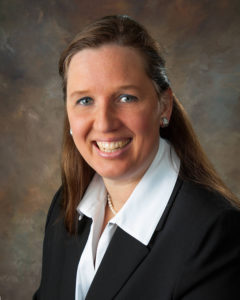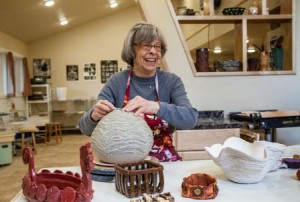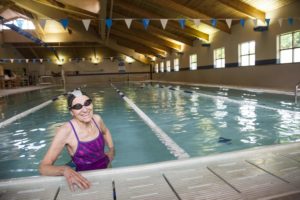“You can’t help getting older, but you don’t have to get old.”
– George Burns –
Aging isn’t what it used to be. In a time when 40 is the new 30, senior citizens are living longer and confounding societal expectations about what it means to grow old. New research suggests that even diseases like Alzheimer’s and dementia, once thought to be inevitable and irreversible, can be prevented, slowed and even reversed.

One key to healthy aging is telomeres, the tiny sequence of repetitive nucleotides at the end of each chromosome. “The longer the telomeres, the healthier you are,” says Dr. Ana Mihalcea, Medical Director for the Geriatric Center of Excellence and the Convalescent and Rehabilitation Center at Panorama Senior Living in Lacey. “The shorter they are, the sicker you get.”
Dr. Mihalcea will be speaking on the topic at Panorama on August 21 from 1:30 – 2:30. Her guest lecture “Youthful and Resilient Aging” will be open to a general audience. “Panorama is very graciously opening the doors to the public,” she says. “Anyone can come, even if they’re young and healthy, to learn how to support themselves and stay healthy as they age. My intent is to make complicated science very simple and applicable so that people can understand it.”
In part, the talk will be based on Dr. Elizabeth Blackburn’s book The Telomere Effect: A Revolutionary Approach to Living Younger, Healthier, Longer. Blackburn won a Nobel Prize for her research on telomeres and telomerase. “There’s a lot of research showing ways of affecting your age and even reversing problems,” says Dr. Mihalcea. “Exercise, good nutrition, and getting enough sleep prolongs your telomeres, while things like chronic stress shortens them. Practicing mindfulness and being present also influences your telomeres and your health.”

Research has shown the importance of mental stimulation and social interaction in reducing memory loss and maintaining brain function. “There are ways to mitigate aging through environmental factors, physical activities, and cognitive support,” says Marla LeFevre, Director of Health Services at Panorama.
The topic will be pertinent for Panorama residents, she says. “We’ve worked pretty closely with Dr. Mihalcea over the years on issues like fall prevention and increasing the health, welfare and functionality of residents as they age. We’re excited about this opportunity for her to share research and findings that help people age successfully and maintain functionality as long as possible.”
Prior to the talk, Dr. Mihalcea will be attending the International Association of Gerontology and Geriatrics World Conference in San Francisco, an event that brings together representatives from medicine, nursing, social science, psychology, finance and policy fields to discuss the latest approaches for improving the quality of life for older adults. “This conference only happens every four years,” says Dr. Mihalcea. “There’s information about biochemical research and policy issues. It’s not just about the medical aspect of aging.”

LeFevre believes that hearing such information will have a positive impact on Panorama residents. “We’re hoping this inspires and energizes them to do things we’ve seen be successful through science. They can develop more resilience and support what their bodies need. If a change in lifestyle is necessary, we have programs like yoga and tai chi to support that.”
Dr. Mihalcea agrees. “People want to have a quality of life and be able to live independently,” she says. “We want them to have more knowledge about what they can do in terms of their health. What do I have to do to prevent things like dementia? Can I do things to reverse it? What supplements can I take for cardiovascular health? I’m hoping to give them ways to be proactive.”
For more information about Panorama visit www.panorama.org or call 1-877-208-6274
Sponsored



















































